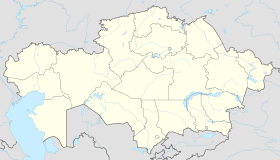Isfijab
|
Sayram Kazakh: Сайрам |
|
|---|---|
 |
|
| Location in Kazakhstan | |
| Coordinates: 42°18′0″N 69°46′0″E / 42.30000°N 69.76667°ECoordinates: 42°18′0″N 69°46′0″E / 42.30000°N 69.76667°E | |
| Country |
|
| Region | South Kazakhstan Region |
| Founded | 10th century BC |
| Government | |
| • Akim (mayor) | Husan Muzafarhanovich Akhmadhanov |
| Area | |
| • City | 10 km2 (4.2 sq mi) |
| Elevation | 600 m (1,970 ft) |
| Population (2009 census) | |
| • City | 32,757 |
| • Metro | Shymkent |
| Time zone | ALMT (UTC+6) |
| Postal code | 160812 |
| Area code(s) | +7 72531 |
| Climate | Csa |
| Old name: Isfījāb | |
Sayram (Kazakh: Сайрам, Sayram, سايرام; Uzbek: Sayrom, Сайром, سەيرام; Arabic: إسفیجاب ‘Isfījāb; Persian: اسپیجاب, Espījāb/Espijâb) is a rural locality located in southeastern South Kazakhstan Region on the Sayram Su River, which rises at the nearby 4000-meter mountain Sayram Su. In medieval times, the city and countryside were located on the banks of the Arys River, into which the Sayram Su river flows. It is now a suburb of Shymkent. Population: 30,887 (2009 Census results); 25,408 (1999 Census results).
The city celebrated the 3,000th anniversary of its founding in 1999. It is among the oldest cities in Kazakhstan, site of the first mosque in Kazakhstan, and similarly among the oldest cities in Transoxania. Sayram is significant today for maintaining mud-brick architecture and the absence of Soviet-style architecture. There are many pre-20th-century mausoleums, and more continue to be built.
Archaeology in Central Asia was active following its conquest by the Russian Empire, but remains a relatively understudied area. There has been some field work done in the city both before and during the rise of the Soviet Union, and there is likewise renewed interest in the city as one of the oldest cities of the independent country of Kazakhstan. Notable among the archaeological discoveries is evidence of an early plumbing system like the kinds found in Samarqand and other cities of the early Persian empires.
There is another city named Sayram in Xinjiang, China located between Kucha and Aksu, which, according to local tradition, was founded by captives captured by the Qalmaqs.
...
Wikipedia

